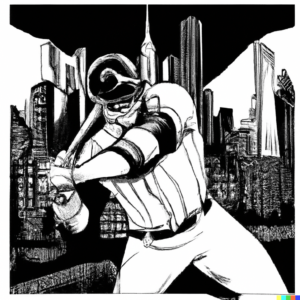So you’ve decided to play the All-Star game Showdown/Single-Game MLB DFS contests on DraftKings and/or FanDuel this evening. Our first piece of advice is to be prepared to lose whatever you put into the mix tonight. More so than any one-game contest all year long, the MLB All-Star game is an absolute mess of short appearances and variance, the most critical thing in lineup construction is differentiation, if you should happen to create a lineup that is competitive for a top spot you certainly do not want to be riding along with a few dozen people to chop the prize. Getting to a strong blend of highly differentiated lineups that account for the variability of both baseball itself and a night on which most players will be receiving 1-2 plate appearances or one inning on the mound.
MLB DFS: All-Star Slate Strategy Notes – 7/11/23 – National League (-110/3.57) @ American League (+101/3.49)
Rules & Roster Construction
The slate takes a somewhat different shape from site to site for single-game contests. On DraftKings, the Showdown slate includes pitchers, who will have the chance to compete for the highly unpredictable win bonus, unless the game is tied after nine innings, at which point the win bonus becomes moot and the actual game is decided by a home run derby that will also not count for fantasy points. DraftKings also differentiates their contest by charging 1.5x salary for the Captain position, with a 1.5x points bonus. The FanDuel slate is more straightforward, the site has two multiplier positions for fantasy points with three utility spots, none of which include a salary multiplier. FanDuel’s MVP position offers a 2x points bonus and the STAR position is worth 1.5x, with no pitchers included in the contest.
The decision points are rather different from site to site, while both will be focused on a wildly unpredictable game, the DraftKings slate requires more care of lineup construction, given the limiting impact of rostering expensive chalk in the Captain position. Typically, our preferred approach is to work with less expensive options in the Captain role to create surplus salary for combinations throughout a lineup on DraftKings, while we can take a more freewheeling approach to FanDuel lineup building. Pitching is another major differentiator between sites, despite booking about an inning each, pitchers are going to be the players on the field who will have scoring potential in their hands at all times, while hitters will be limited to an almost binary did they/did they not situation. A pitcher who books a clean two-strikeout inning will be worth 6.25 DraftKings points in a non-multiplier spot, a hitter will have to hit a double with a run driven in or better (as one example) in his one or two plate appearances to exceed that score. All-Star games in MLB are not like other sports, the implied run totals for tonight are just 3.57 and 3.49, and the game is taking place in a pitching-friendly environment, any expectations for major outbursts at the plate against the ridiculous list of pitchers that will be on the mound on both sides should be kept well in check. At the same time, pitchers will not offer nearly the same ceiling as hitters on a slate of this nature. With a cap of an inning, two innings at most, the key to successfully rostering a pitcher will ultimately come down to booking the correct starter to earn the win bonus, which is essentially the same as throwing a dart at which hitter will connect to drive one over the wall for a big fantasy score.
FanDuel allows for a more relaxed approach to lineup building, one can take the angle of attempting to capture correlated scoring from early production from the starting lineups by positioning a lineup in reverse of the batting order, for example placing the cleanup hitter in the MVP spot with the second or third hitter in the lineup who he will hopefully drive in for correlated points in the STAR spot and another option in a UTIL position at one’s discretion. Stacking a lineup in that nature is one angle to take into the FanDuel contests, not needing to pay a salary multiplier is a luxury, but lineups should not be focused exclusively on the top end of the starting batting order, or even on exclusively starters. The benches on both sides of this game are very much in play, we are including last year’s box scores below as a reference point for what should be expected from the game flow.
2022 All-Star Game Box Scores – Pitching
(all box scores provided via Baseball Reference)
The following box scores from last year’s All-Star game are presented for reference purposes in order to provide accurate expectations for the time that a player should be expected to see in this evening’s contests. Typically the starting pitchers will work an inning with each of the starters from the bench taking an inning afterward, followed by a piecemeal approach to utilizing relievers and closers to round out the game. When rostering pitchers it can pay to remember the cost savings involved in taking an inning from a $4,000 high-strikeout reliever as compared to a $5,400 starter when both will be expected to work just an inning, starters may be the safer approach for booking points but safety should be the last thing on one’s mind when building MLB All-Star Game Showdown lineups.
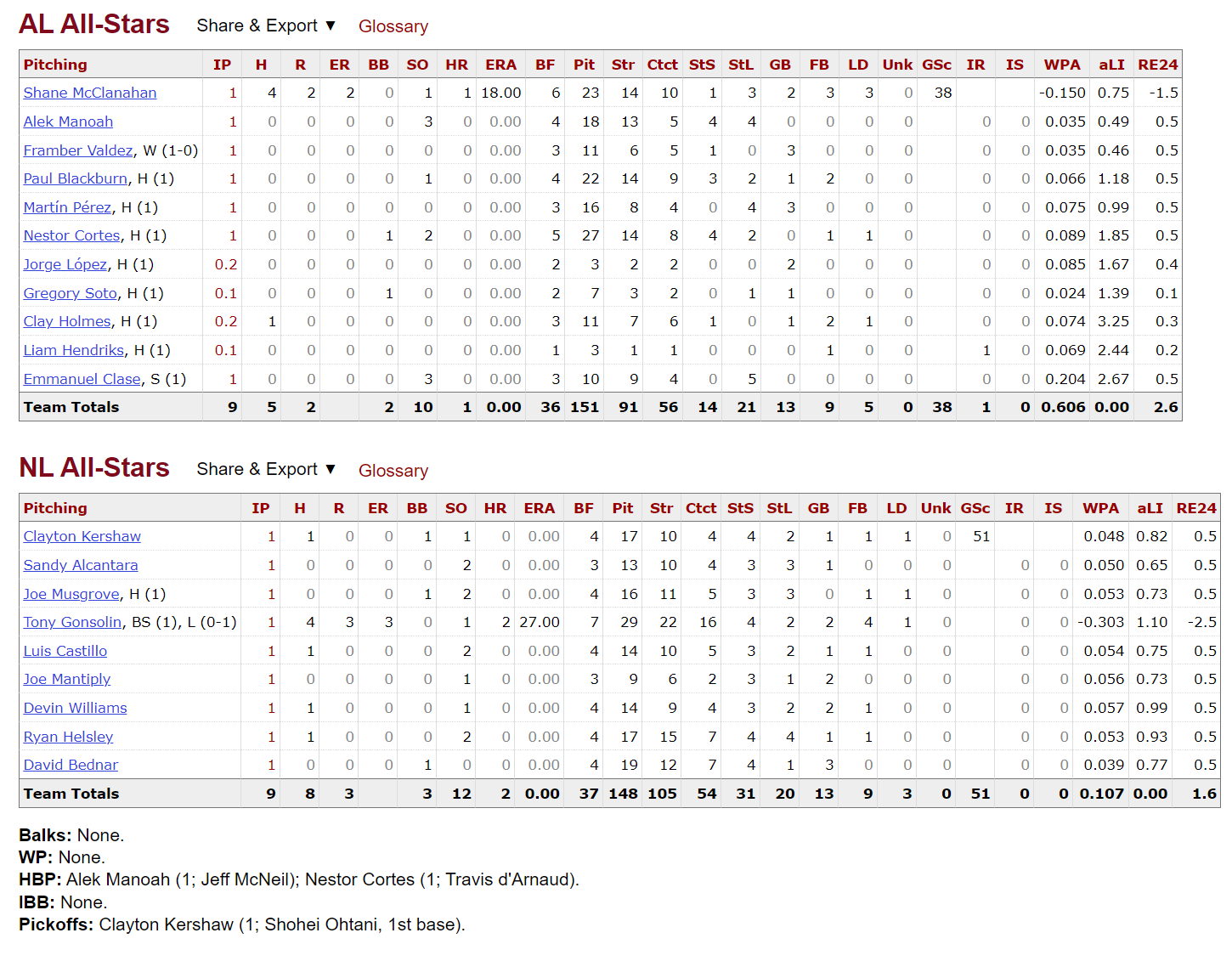
2022 All-Star Game Box Scores – Hitting
Typically starters can manage two plate appearances with bench players seeing 1-2 opportunities depending on the nature of the game. As can be seen below, only five of the 21 players who got in the game for the American League last year received just one plate appearance, but no one received three. On the National League side, both leadoff superstar Ronald Acuna Jr. and a player who started on the bench, Juan Soto, saw three plate appearances while eight of the 21 hitters saw just one opportunity. It can pay significant returns to simply focus attention to hitters who are not starting the game with the expectation that they will see the same, or similar, opportunities as the starters. Of course, this is not to suggest that a lineup should be entirely comprised of non-starters, but getting to a strong blend of options with an openness toward somewhat wild differentiation is highly recommended for showdown play.
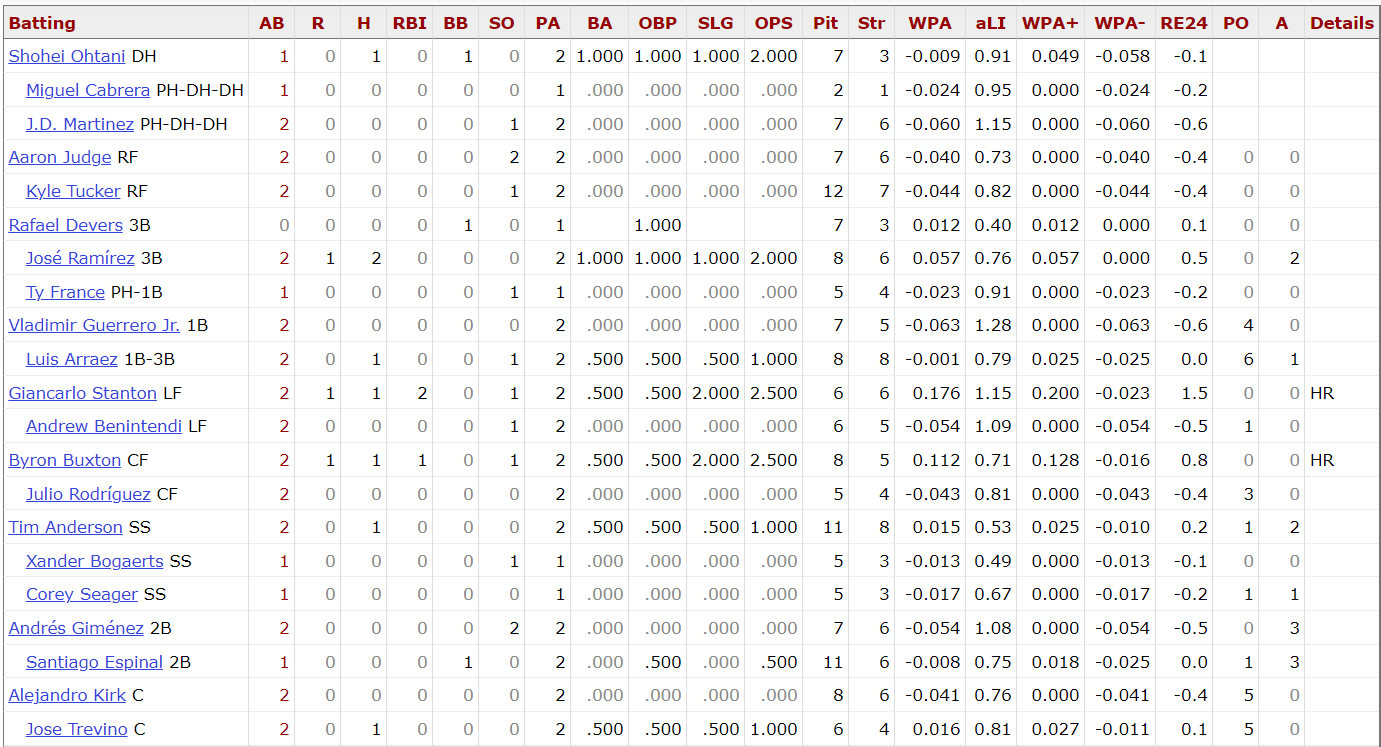
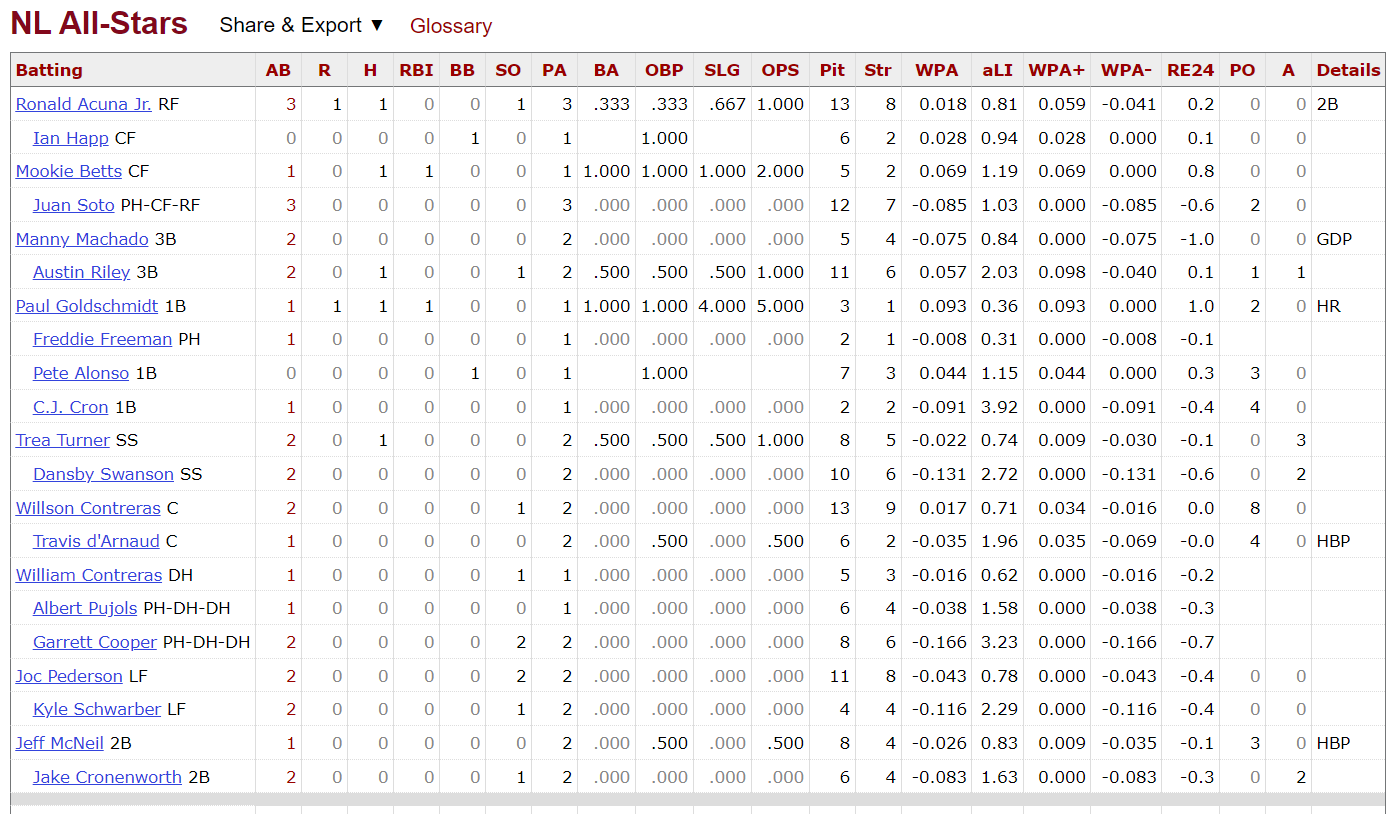
2023 Lineups & Pitchers
There are several critical considerations in creating lineups for this unique contest, paramount among them would be ensuring that we are utilizing players who are actually going to appear in the game. The following players were named to the All-Star Game but will not be appearing, in all cases the replacement players have been included in the details below:
AL:
- Aaron Judge
- Mike Trout
- Yordan Alvarez
- Shane McClanahan
- Kevin Gausman
- as a pitcher – Shohei Ohtani (Ohtani is starting and hitting second for the American League but is not expected to pitch)
NL:
- Dansby Swanson
- Spencer Strider
- Bryce Elder
- Clayton Kershaw
- Marcus Stroman
- Devin Williams
National League
Starting Lineup

Bullpen

Bench

*All salaries are UTIL base salaries
American League
Starting Lineup

Bullpen

Bench

*All salaries are UTIL base salaries
Follow Us on Twitter. Join us in Discord. Subscribe to the YouTube Channel.


